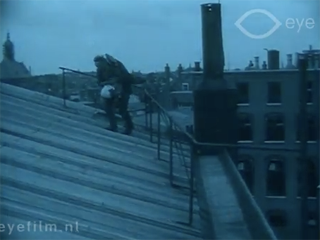Gloria transita

-
Weitere Titel: Vervlogen roem
Artistentrots
La Gloire est périssable
-
Jahr: 1917
-
Beschreibung: Fictional film (with opera excerpts) by Johan Gildemeijer about a street singer who enjoys a brief career as an opera artist In Gloria transita (Bygone Glory), directed by John Gildemeijer, a street singer manages to work his way up to the position of an opera artist, only to be struck by fate, and return to his life on the street. Inspired by Cecil B. DeMille's adaptation of the opera Carmen (1915), which ran for years in American film theatres with the accompaniment of a permanent troupe, for Gloria transita Gildemeijer shot some famous opera fragments from e.g. Rigoletto, Faust, and I Paggliaci. These were incorporated into the story in such a way that they served to advance the plot. During the screening of the film, the singing of the opera fragments was performed live by a vocal quartet behind the screen. The audience was very impressed by the music, as well as the synchronization of voice and image. The film enjoyed repeat performances in the Netherlands and Belgium until 1927. This was not the case for the sequel to Gloria transita, namely Gildemeijer¿s Gloria fatalis of 1921. Despite collaborating with film composer Max Tak, the film was not successful. As the 'Algemeen Dagblad' wrote in 1922, the story 'had to focus entirely on, and wrench itself towards, the demands of creating a way to reproduce excerpts from several famous operas'. The film lacked the sophistication with which Gloria transita incorporated the fragments into the plot.
-
Schlüsselwörter: 24 september 1917 / Amsterdam / Nederland / Rotterdam / Den Haag / Scheveningen / muziek / opera's
-
Sammlung:
-
Anbieter: EYE Filmmuseum (The Netherlands)
-
Rechte: In Copyright - EU Orphan Work
-
Produktionsfirma: Rembrandt Film Co (Amsterdam)
-
Regie: Johan Gildemeijer
-
Datum:
-
Dokumenttyp:
Related Names
- Jan van der Horst (I) | Actor
- Ernst Winar | Actor
- Fred Vogeding | Actor
- Henny van Merle | Actor
- Irma Lozin | Actor
- Wilhelmina van den Hoeck | Actor
- August van den Hoeck | Actor
- Nelly de Heer | Actor
- Johan Gildemeijer | Actor
- Jan Feith | Actor
- Piet Fuchs | Actor
- Eberhard Erfmann | Actor
- Jacques Cauveren | Actor
- Johan Gildemeijer | Producer
- Johan Gildemeijer | Screenplay
- Willy Mullens | Director of photography
- Johan Gildemeijer | Director
 Deutsch
Deutsch English
English Čeština
Čeština Dansk
Dansk Français
Français Italiano
Italiano Lietuvių
Lietuvių Magyar
Magyar Nederlands
Nederlands Norsk
Norsk Português
Português Suomi
Suomi